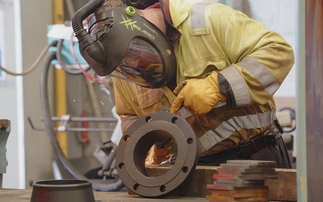
Partner Content: In this exclusive Q&A with Shopify's Head of Sustainability, Stacy Kauk, reveals why reversing climate change cannot happen without support for the burgeoning carbon removal sector
BusinessGreen: Shopify is a big advocate of carbon removal - where does the potential lie for this nascent sector?
Global warming is speeding towards breaking the critical 1.5C limit. We've passed the point where carbon neutrality can come to the rescue. Pursuing deep emissions reductions won't be enough on its own; we must also push towards large-scale carbon removal.
Thankfully, global stakeholders are beginning to realise how critical durable carbon removal is to rewriting our planet's future, as it can pull excess concentrations of carbon dioxide out of the atmosphere and store it for 100+ years. Such projects worldwide are benefitting from state funding and large-scale investment and, in turn, driving innovators to push the boundaries of what's possible with carbon removal.
If we play this right, carbon removal can help reverse climate change. But credit purchases from both early-stage and more advanced projects need to keep increasing so that solutions can continue to scale. That's why Shopify has committed more than $41.1m to date through our Sustainability Fund; this includes 56,800 tonnes of durable carbon removal, making us one of the largest known corporate purchasers in the world, and we hope to inspire many other buyers to follow suit.
How can the carbon removal market continue its growth trajectory?
Despite its recent success, we need more momentum in the industry and that comes from capital coming into businesses. Venture funding has consistently been available for companies with a few early buyers, but there are large funding gaps at the pre-seed, seed, and project finance stages. We need investors to get comfortable funding early projects without a buyer, and corporate buyers to sign large offtakes with projects that are ready to scale to unlock project finance.
Finding buyers is critical for emerging companies as their investment amplifies potential and is catalytic to scaling the technology. The early-stage companies Shopify has partnered with have raised nearly $1.6bn in capital, received over 200 large follow-on purchases, and hired over 800 employees, while 15 of our partners have increased their carbon removal capacity.
Why should businesses get involved in buying carbon removal?
For a business to have a holistic approach to fighting climate change, it needs to focus on both the reduction and removal of carbon. While carbon removal technologies have experienced impressive growth, the industry is still in its infancy. We need to get more companies involved, purchasing carbon removal credits, if we are to successfully scale the market and unlock its potential in the race to net zero.
If businesses realistically hope to achieve net zero emissions, the Science Based Targets Initiative (SBTi) says they will still need to use permanent carbon removal credits for any emissions they aren't able to reduce. By acting early as a buyer of credits from a variety of carbon removal technologies, firms will help ensure supply exists when they'll need it in the future to reach net zero. Plus, it will allow them to lock in credits in what is expected to remain a supply-constrained market for years to come.
Buying carbon removal doesn't have to be complex or time-consuming. It's not just for companies with large sustainability teams and budgets. It's not for certain sectors of the economy. We truly believe any business, of any size, in any industry can and should get involved. That's why we released Shopify's Buying Carbon Removal, Explained guide, which covers everything you need to go from researching suppliers to inking your first carbon removal contracts to getting the actual credits, including, of course, what to say to scrutinising finance teams. It outlines how to make the case for buying carbon removal, where you can source reliable, high-impact credits, sample commercial clauses for crafting impactful agreement terms and structures, and more.
How can the carbon removal market better prove its value to investors?
Building a market and establishing trust is what will unleash the full potential and scale of carbon removal. There's no bigger reassurance for buyers than a rigorous approach to quantifying carbon removal, so if a carbon removal startup can show a strong approach to monitoring, reporting, and verification (MRV), it stands a good chance of justifying buyer spending.
Unfortunately, MRV is struggling to keep pace with the industry's rapid growth. Proactivity and collective action will help move the needle in demonstrating value. The entire carbon removal ecosystem needs to work together to contribute to the development of a robust MRV system that includes high-quality, data-driven methodologies that are open-sourced and stand up to peer review.
The European Commission's proposed certification framework seeks to bring some reliability to verifying high-quality carbon removal technologies, but we must build on it. Methodologies for durable carbon removal processes are the next step, and startups are looking to standard bodies and third-party associations to make this happen. The need to enhance the validation process for early-stage technologies and build consensus around standards is huge.






